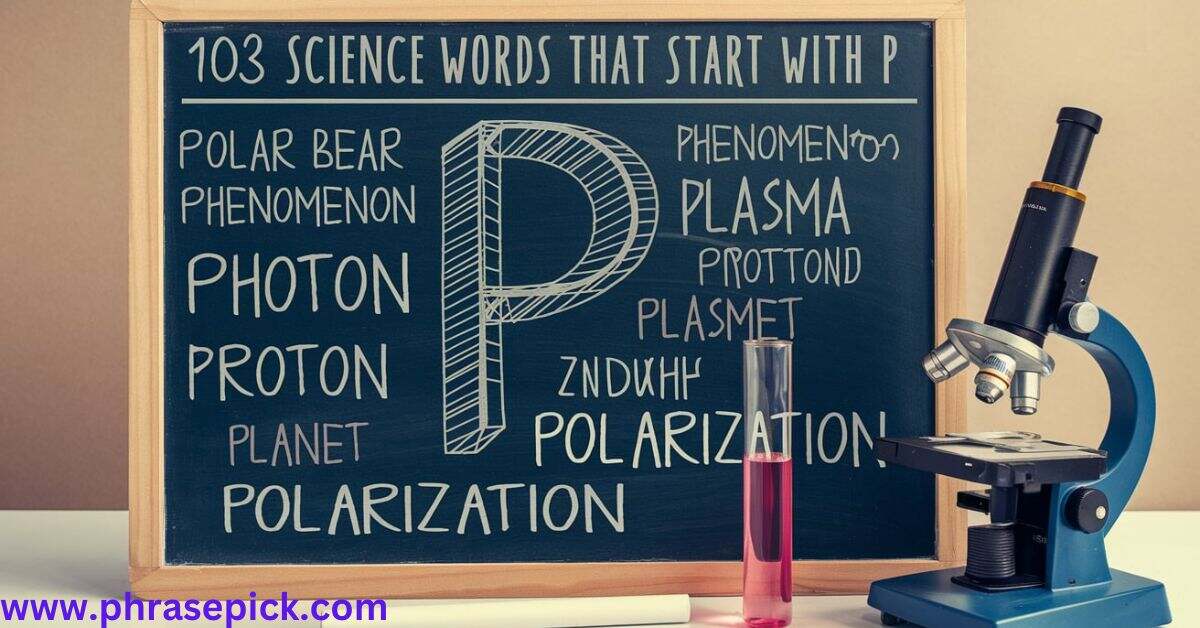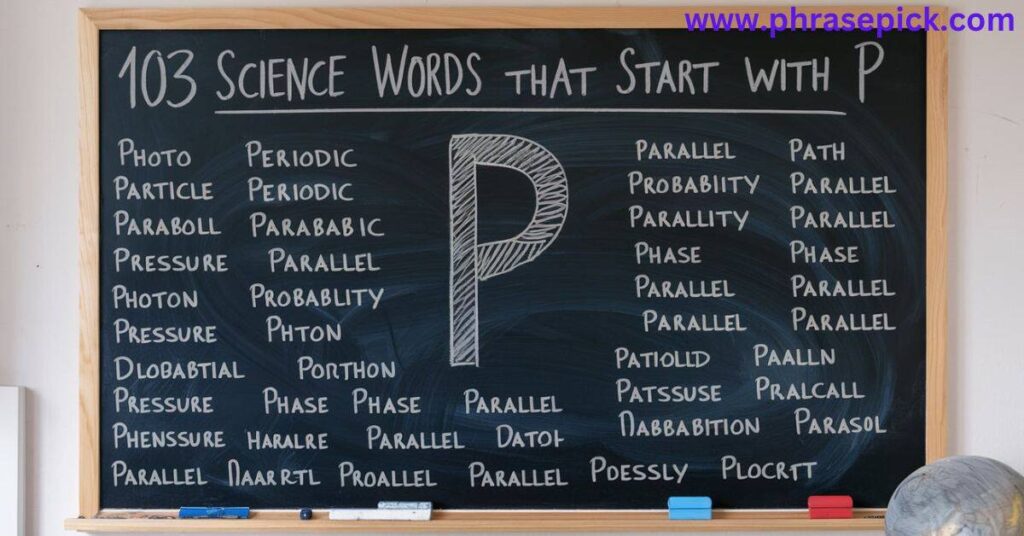Science uses many terms to explain natural phenomena, and a surprising number begin with the letter P. These words cover topics in physics, biology, and environmental science. Learners can expand their scientific vocabulary and understanding by exploring scientific words that start with P. For example, words like photosynthesis and planetary refer to essential processes and celestial studies.
In addition, terms like proton and polymers are essential in understanding microscopic and molecular structures. This knowledge builds a strong foundation in physics fundamentals and biological concepts. Knowing these P-words helps students comprehend core processes in various fields of science. For instance, terms like photosphere and protostar are crucial in astronomy and space science.
In summary, mastering these P-words is valuable for anyone studying scientific concepts. Ultimately, a strong science vocabulary allows clearer, more detailed explanations in both everyday and professional scientific discussions.
Science Words That Start With P

| Word | Word | Word | Word |
| Photosynthesis | Proton | Planetary | Polymer |
| Precipitation | Physics | Paleontology | Pathogen |
| Plate Tectonics | Plankton | Photosphere | Protostar |
| Potential Energy | Phylum | Pollination | Photon |
| Proteins | Probability | Paleoclimate | Periodic Table |
| Phenotype | Pangaea | Plasma | Pyroclastic |
| Parasite | Pathology | Permafrost | Petrography |
| Pulsar | Population | Phytoplankton | Plasmid |
| Particle | Polypeptide | Perception | Phosphorus |
| Pendulum | Prokaryote | Pathogenesis | Prebiotic |
| Protist | Paleoecology | Photosensitivity | Psychrometer |
| Perihelion | Pyrometer | Polymorphism | Pluviometer |
| Phagocytosis | Protoplasm | Photosystem | Polarization |
| Phospholipid | Pyrolysis | Paleobiology | Polarity |
| Paleomagnetism | Protostome | Precipitate | Population Density |
| Phosphorescence | Psychrophile | Planetesimal | Plutonium |
| Phototropism | Polymerase | Phosphorescent | Photospectrometry |
| Pleiotropy | Photolysis | Phosphorylation | Photochemistry |
| Pseudopodia | Pyrite | Phosphatase | Phylogenetics |
| Pyroclast | Phytochrome | Photoreceptor | Protoplanet |
| Paleobotany | Peptidase | Phonation | Paleosol |
| Photometry | Pneumatics | Polarity | Phosphatide |
| Polyatomic | Phyllotaxis | Piezometer | Pyrimidine |
| Phosphoresce | Paleozoology | Pyrography | Photomicrography |
| Psammophile | Phyllosphere | Polyploidy | Phlebotomy |
| Phagocyte | Phycomycete | Protandry | Photobiology |
| Paleobiogeography |
Read This Also:105 Science Words That Start With W
FAQ’S
What is the term for the study of fossils and ancient life forms?
- A) Parasitology
- B) Paleontology
- C) Pathology
- D) Phonology
Which word describes the process by which plants make food using sunlight?
- A) Photosynthesis
- B) Photolysis
- C) Phagocytosis
- D) Precipitation
What is the term for a particle found in the nucleus of an atom with a positive charge?
- A) Proton
- B) Photon
- C) Plasmid
- D) Phosphate
What scientific field studies the interactions between organisms and their environments?
- A) Physiology
- B) Psychology
- C) Pathology
- D) Parasitology
Which science term refers to the force that pulls objects toward Earth?
- A) Pressure
- B) Plasma
- C) Precipitation
- D) Gravity
In chemistry, what is the term for a substance made of two or more elements bonded together?
- A) Particle
- B) Polymer
- C) Product
- D) Phosphate
What is the term for the smallest unit of an organism that is considered alive?
- A) Proton
- B) Plasma
- C) Photon
- D) Cell
What science term describes the increase in speed or rate of a reaction?
- A) Pendulum
- B) Pressure
- C) Pulse
- D) Acceleration
Which term refers to a model that represents a smaller version of a larger concept in science?
- A) Parallel
- B) Paradigm
- C) Prototype
- D) Prism
What do we call the area of biology focused on how organisms function?
- A) Physiology
- B) Pathology
- C) Pharmacology
- D) Paleontology
What is the term for a large cloud of gas and dust in space?
- A) Photosphere
- B) Planet
- C) Plasma
- D) Protostar
the term describes an organism that lives on or in a host organism, often causing harm?
- A) Parasite
- B) Predator
- C) Photosynthesizer
- D) Protist
What is the term for the angle at which light passes through a medium?
- A) Parallel
- B) Prism
- C) Pitch
- D) Refraction
What is the name of a gas layer around the Earth that protects it from UV radiation?
- A) Plasma
- B) Polystyrene
- C) Polycarbonate
- D) Ozone layer
term describes the measure of acidity or basicity of a solution?
- A) Proton
- B) Plasma
- C) pH level
- D) Polarity
Answers
- Answer: A) Photosynthesis
- Answer: A) Proton
- Answer: D) Parasitology
- Answer: D) Gravity
- Answer: B) Polymer
- Answer: D) Cell
- Answer: D) Acceleration
- Answer: C) Prototype
- Answer: A) Physiology
- Answer: D) Protostar
- Answer: A) Parasite
- Answer: D) Refraction
- Answer: D) Ozone layer
- Answer: C) pH level
Read This Also:110 Science Words That Start With Z
Conclusion
learning science words that start with P broadens understanding of diverse scientific topics. For instance, words like photosynthesis or protostar provide insight into the workings of natural and cosmic processes. Furthermore, terms such as proton and polymer explain molecular structures that form the basis of material science.
In addition, this vocabulary supports clear communication in fields like environmental science, genetics, and physics. For example, a word like precipitation relates to weather patterns and the water cycle. Moreover, using these terms accurately demonstrates a deeper understanding of science, useful for both students and professionals.
Finally, a well-rounded science vocabulary enables richer discussions and more precise explanations. In short, it builds a foundation for lifelong learning in science. Overall, mastering these P-words contributes to a better comprehension of scientific principles and universal knowledge.

James Smith is an experienced blogger at PhrasePick, where he shares his expertise in English grammar and figurative language. With a passion for simplifying complex topics, James creates engaging content that helps readers master the nuances of the English language.





